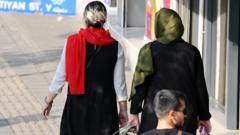A recent UN report reveals Iran's use of drones and mobile apps to monitor and punish women for hijab violations. The state engages in "state-sponsored vigilantism," creating civilian informants. Consequences for non-compliance can be severe, including arrest and violence. The report, based on testimony from nearly 300 victims, will be presented to the Human Rights Council.
Iran’s Surveillance State: Drones and Apps Enforcing Hijab Compliance

Iran’s Surveillance State: Drones and Apps Enforcing Hijab Compliance
The Iranian government escalates its crackdown on women defying dress codes, utilizing advanced surveillance technology and citizen reporting apps to enforce mandatory hijab laws.
Iran's government is ramping up its efforts to enforce a strict dress code, particularly targeting women who resist wearing the hijab. According to a new report from the United Nations, Iranian authorities are employing a combination of drone surveillance, facial recognition software, and a citizen reporting app to monitor compliance with the Islamic Republic's dress rules. This strategy is part of a broader framework labeled as "state-sponsored vigilantism," where ordinary citizens are encouraged to report on women who allegedly violate dress codes in public and private vehicles.
The report underscores the extensive use of both drones and security cameras in metropolitan areas like Tehran, as well as in southern regions. For those women who challenge these laws or even protest against them, the consequences can be dire, ranging from imprisonment to physical abuse and even sexual violence while in custody. This escalation in enforcement follows the tragic death of Mahsa Amini in custody in 2022, which sparked widespread protests against Iran's oppressive regime.
The Independent International Fact-Finding Mission on Iran states that the mandatory hijab laws contribute to systemic discrimination that permeates women's lives, creating an environment where even educational institutions are a source of surveillance. At Tehran's Amirkabir University, for instance, facial recognition technology has been implemented to identify and penalize women not adhering to dress regulations.
Additionally, the Nazer mobile app, developed by Iranian police, allows users to report women seen without their hijabs in public transport and other vehicles. Reports submitted through this app can trigger police alerts and warnings to the vehicle's owner, while non-compliance can result in the impounding of the vehicle.
The UN report indicates that investigators interviewed nearly 300 victims and examined the failures within Iran's judicial system, which has been characterized as lacking in true independence. Victims of human rights abuses often face retaliation and intimidation from authorities. This includes evidence of extrajudicial killings and sexual violence against detainees, with harrowing accounts from women detailing torture and severe mistreatment in custody.
This troubling report will be presented to the Human Rights Council on March 18, exposing the relentless state of oppression that women in Iran endure in their fight for basic rights and freedoms.






















